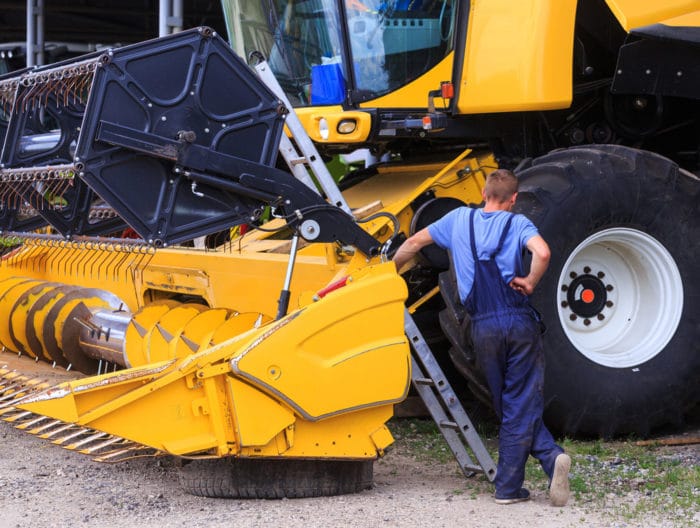Why We Love It
-
$38,510Potential Avg. Salary
-
7.2%Job Growth Rate
-
Growing DemandJob Outlook
-
Flexible HoursCareer Attribute
As family farms develop into agricultural businesses, complex machinery now requires highly trained technicians like farm equipment mechanics to perform repairs, overhauling and routing maintenance.
Recommended Schools
What is a Farm Equipment Mechanic?
Duties
When you take on a job as farm equipment mechanic, you are responsible for completing the following duties:
- Undertake routine preventative maintenance tasks based on work orders, which ranges from overhauling farm machinery, conveyors, grain scales, pay loaders, skid loaders, tractors, arms, legs and other agricultural mobile equipment.
- Use a wide range of equipment and tools efficiently such as ARP probe, OHM meter, arc welder, acetylene torch and other hand tools.
- Perform training of junior technicians as required, to hone their skills in repairs and troubleshooting depending on their functions.
- Keep up to date with all safety regulations and procedures, being mindful of them while working on repairs throughout a facility.
- Be proactive and providing constructive suggestions on improving maintenance needs in the department and improving overall efficiency.
Day In The Life
A farm equipment mechanic spends much of the day repairing as well as maintaining tractors and other farming equipment so they are running optimally without fail. Many times, you will be using tools to diagnose and suggest solutions to any problems with a machine’s functioning.
The repair process varies between a few hours to a few days depending on the complexity of the machine and the type of problem detected. After a detailed testing process to narrow down the issue, you would follow a step by step procedure to either replace or upgrade parts. Many times, the answer may be an easy fix, such as calibration or installation of a particular component, e.g. reattaching the chain of a chainsaw or updating a fertilizer dispenser.
Work Schedule
Farm equipment mechanics have irregular hours based on the season and its associated workload. For instance, the busiest time during the year is during planting and harvesting seasons, when farm equipment mechanics can have to work up to 12 hours per day and 6 to 7 days in a week. When it is off-season during winter months, you can expect to work less than 40 hours each week. You will often find yourself working outdoors on heavy equipment, using hand tools and standing or lying down in stressful positions. There is a low risk of getting small burns, bruises or cuts when on the job.
Growth Of The Job
With continued advancements in agricultural technology and the use of heavier equipment to supplement higher demands for produce, farm equipment mechanics will be in demand. Job opportunities are expected to grow as fast as the average rate for occupations, i.e. 7 to 13%. Further, as experienced farm equipment mechanics retire or leave the occupation, there will be new openings for newer technicians.
Individuals in this profession will find employment with firms that rent, lease or sell farm equipment as well, as professional repair services form a significant aspect of business revenue. You can easily advance to working in field service jobs or even move up to the supervisor or service manager level, with enough years in the industry. A few farm equipment mechanics also move on to invest in an established franchise or start their own business enterprise.
Typical Employers
Farm equipment mechanics are hired by agricultural equipment dealers, operators and manufacturers, rental and service companies. Employers in the market currently in search of a reliable farm equipment mechanic include private corporations such as Seneca Foods Corporation, Tyson Foods or Hutson Inc., and educational institutions such as Colorado State University.
Recommended Schools
How To Become a Farm Equipment Mechanic
The job of a farm equipment mechanic is particularly suited to individuals that identify with subject areas such as transportation, agriculture and mechanics. In this industry, many employees gain their qualifications through on the job training with a high school diploma minimum. However, having a mechanical skillset and being knowledgeable about farm equipment or technology comes in handy. Since you will be working closely with equipment, the ability to use both manual as well as power hand tools will be a strong asset.
Reading abilities and good communication skills are further essential for a mechanic position as you will have to frequently interpret and read service manuals for repairs. To start off early in this career, you should take courses in physics, chemistry and mathematics from high school onwards. A farm equipment mechanic who completes their training at a vocational school or gets an associate’s degree, will advance faster to the level of an experienced worker.
Farm Equipment Mechanic Salary Data
We’ve provided you the following to learn more about this career. The salary and growth data on this page comes from recently published Bureau of Labor Statistics data while the recommendations and editorial content are based on our research.
National Anual Salary
Low Range
$29,720Average
$38,510High Range
$56,470National Hourly Wage
Low Range
$14/hrAverage
$19/hrHigh Range
$27/hrHow do Farm Equipment Mechanic salaries stack up to other jobs across the country? Based on the latest jobs data nationwide, Farm Equipment Mechanic's can make an average annual salary of $38,510, or $19 per hour. This makes it an Above Average Salary. On the lower end, they can make $29,720 or $14 per hour, perhaps when just starting out or based on the state you live in.
Salary Rankings And Facts
#558 Nationally for All Careers
Programs and Degrees
Here are the most common degrees for becoming a Farm Equipment Mechanic. a is usually recommended and specifically a degree or coursework that prepares you for the particular field, see below.
Highest Education Among Farm Equipment Mechanics
- 0% Doctorate
- 0.6% Masters
- 3.1% Bachelors
- 10.9% Associates
- 26.1% College
- 45.3% High School
- 14% Less than High School
Job Growth Projections and Forecast
2014 Total Jobs
40,3002024 Est. Jobs
43,200Job Growth Rate
7.2%Est. New Jobs
2,900How does Farm Equipment Mechanic job growth stack up to other jobs across the country? By 2024, there will be a change of 2,900 jobs for a total of 43,200 people employed in the career nationwide. This is a 7.2% change in growth over the next ten years, giving the career a growth rate nationwide of Below Average.
Growth Rankings And Facts
#305 Nationally for All Careers
What Companies Employ The Most Farm Equipment Mechanics
| Industry | Current Jobs | New Jobs Needed | % Increase |
|---|---|---|---|
| Farm and garden machinery and equipment merchant wholesalers | 24,300 | 2,000 | 2% |
| Crop production | 5,200 | 200 | 0% |
| Lawn and garden equipment and supplies stores | 2,100 | 100 | 0% |












